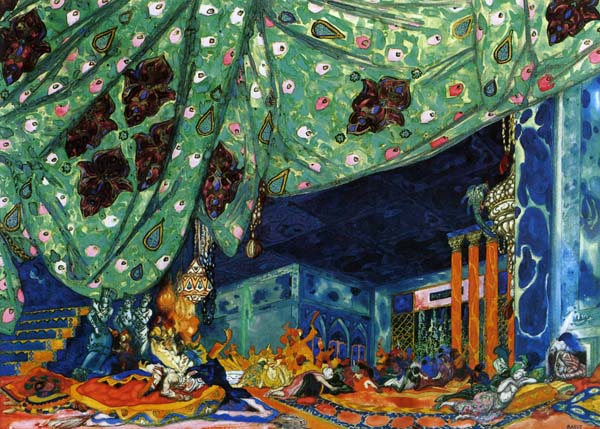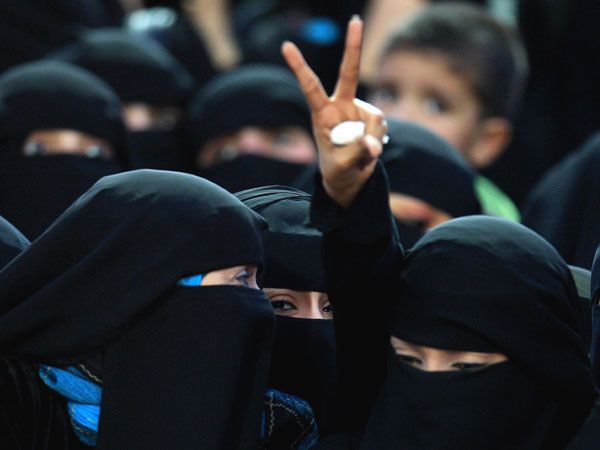26 May 2016
“Once There Was A King…”
Scheherazade lives.
by Neil Tidmarsh

 “Once there was a King…” So begins the traditional storyteller, wearing a fez and brandishing an ancient sword, in any café in any town in the Middle East since the beginning of time. (It’s a custom that survives even in today’s war-torn Damascus, amazingly, as Tom Coghlan reported in The Times this week.)
“Once there was a King…” So begins the traditional storyteller, wearing a fez and brandishing an ancient sword, in any café in any town in the Middle East since the beginning of time. (It’s a custom that survives even in today’s war-torn Damascus, amazingly, as Tom Coghlan reported in The Times this week.)
“Once there was a King…”
The Arabian Nights are eternal, but how would a modern-day Scheherazade continue?
“…who ruled over one of the richest and most powerful countries in the world. His kingdom was huge, but much of it was an uninhabitable desert, a wasteland of yellow sand and brown rock baking beneath a blazingly hot sun and a glaring blue sky. Yet it was still rich. Because, lying underground, in the darkness beneath the brightness of those sun-lit sands, was a vast black sea. A bottomless ocean of thick, smelly, sticky black stuff. And this black stuff was so valuable that other countries in the world were prepared to pay the King huge amounts of gold for it and to fight wars with each other over it.
So the King was rich, his kingdom was rich, and his people were rich. But were they happy?
There were no cinemas in his kingdom. No theatres, no concert halls. Music and dancing and alcohol were forbidden. The people had little power. They were subject to very strict laws. Men and women could not mix together in public. Women were treated like children. Their faces were hidden in public. They could not drive cars. They could go nowhere and do nothing without the permission of an adult male – preferably their father or their husband. These rules were enforced by the kingdom’s priests (who were many and powerful) for the moral welfare of the people.
Nevertheless, the people behaved themselves because they were rich. They were satisfied. They didn’t have to work much, and they could behave as they wished inside their own homes where the priests couldn’t see them, and they could always visit other countries to drink and eat and dance and listen to the music and watch the plays and films which were forbidden in their own country.
And then, one day, things began to go wrong for the King.
He had an Enemy to the East, a powerful country ruled not by a King but by priests who had overthrown their King some decades before. These priests and the King’s priests believed in the same God, but they were enemies because they disagreed on who were the true heirs of that God’s greatest Prophet. The King and this Enemy competed for influence in the smaller countries that lay between them. Eventually civil war broke out in a number of these countries. The King backed one side in these civil wars, and the Enemy backed the other. The wars were very costly. Soon the King was spending nearly all the gold from his black stuff on these wars. He and his kingdom and his people were not so rich any more.
And then things began to get worse.
The King had a Friend to the West. This Friend was also very rich and powerful, possibly the richest and most powerful country in the world. He had always bought lots of black stuff from the King. But then he discovered ways of making lots of black stuff in his own country, so stopped buying so much from the King. The King was not happy. He lowered the price of his black stuff so the people making it in his Friend’s country couldn’t compete. But that didn’t really work, and it just meant that he got even less gold for his black stuff. He and his kingdom and his people were soon in danger of becoming as poor as everyone else in the world.
And then things began to get even worse.
His spies told him that his Enemy was building a dreadful weapon, a terrifying machine which could destroy the King and his country in a single explosion. He asked his Friend to join him in the wars against this Enemy, to help him destroy the Enemy’s evil weapon. But the Friend, instead of fighting, spoke to the Enemy and extended the hand of friendship to him. The Friend thought it would be better to talk than to fight, and got the Enemy to promise to stop trying to build the evil weapon, and rewarded the Enemy for his promises. The King was not happy. He didn’t trust the Enemy. He believed that the Enemy wouldn’t keep its promise, that the Friend’s rewards would make it stronger, and that it would succeed in making its evil weapon sooner rather than later.
And then things got even worse than that.
There were suddenly many revolutions in the countries neighbouring the King’s realm. The people in those countries were very unhappy. They had almost as little freedom as the King’s own people, and as little power, but they were much poorer. They rose up against their rulers, and there was much bloodshed and violence and disorder, and many of the rulers were overthrown. The King’s own people saw what was happening. They were no longer as satisfied as they had been, because they were getting poorer. And bad people (said to be from the Enemy) were beginning to set off bombs in their towns to kill them as they prayed in their temples or shopped in their markets. The King’s people began to twitter and murmur angrily amongst themselves, and discontent began to grow.
The King and his family were very worried.
Luckily, the King had a very wise son. This son was so wise that the King gave him lots of power to try to save the King and the country and the people from all these dangers.
The Prince, being very clever, knew that the country couldn’t rely on the black stuff keeping them rich any more. So he announced plans to develop businesses and jobs which weren’t dependent on the black stuff. To pay for these plans, he decided to sell off a fraction of the kingdom’s share in the black stuff business to other people in other countries. This fraction would still bring in a huge amount of gold which would help his people to set up other businesses.
He knew that his father’s kingdom would have to stand on its own two feet in the world and fight its own wars without so much help from the big Friend in the West. So he announced plans to strengthen the kingdom’s army and to make alliances with other friendly countries nearer to him against the Enemy in the East.
He knew that his own people weren’t as satisfied as they had been, and he worried that they might become so dissatisfied that they might even rise up in rebellion like their neighbours. If they couldn’t be richer than everyone else, perhaps they would be happier if they had a bit more of the freedom that other people in the world enjoyed. So he created a General Authority For Entertainment, which suggested that perhaps cinemas and theatres and concerts and music and dancing weren’t such a bad thing after all.

He knew that fifty percent of his people didn’t like being treated like children, that they wanted to drive cars and appear in public without their faces hidden, and be free to do what they wanted and to go where they wanted without the permission of someone from the other fifty percent of his people. He also knew that the rest of the world agreed with them, that a lot of other countries would have more respect and goodwill for his father’s country if this unhappy fifty percent were given the same rights and freedoms as the privileged fifty percent.
But he also knew that the priests in the kingdom would be very angry with him and his family if he did away with all the rules and regulations which protected the moral welfare of his people. So he had to be very careful, to move very slowly, or the priests might rise in rebellion as they had in the Enemy’s kingdom several decades ago. So he began by making sure the priests’ police didn’t break any laws themselves in their efforts to keep the people good and well-behaved, and that the priests and their police dealt with the people more kindly. Then he allowed each of the unfree half of his people to be given their very own copy of the marriage contract when they got married to one of the free fifty percent. And he allowed them to vote in some elections. It wasn’t much, but, with the General Authority For Entertainment, it was a start…
So what happened?
Did the prince succeed, and save his country by making sure it carried on as before, happy and safe and rich and stable?
Or did everyone just get poorer and poorer and more and more unhappy? Did the people rise up in rebellion, demanding not just bread and circuses but more freedom and a share of the King’s power as well, and plunge the kingdom into bloody violence and disorder?
Or did the priests rise in rebellion against the prince’s moves to relax the laws enforcing good behaviour and moral well-being among the people? Did they overthrow the King and his family, as had happened in the Enemy’s country only forty years before?
Or did the war between the kingdom and the Enemy escalate into an apocalyptic confrontation, exploding into the world war which many people had feared it would become, with all the other powers in the world drawn into a terrible, universal conflict? Did the Enemy complete its evil weapon and unleash it on the kingdom, utterly destroying the King and his family and his people and country?
Well, let me tell you what happened. One day, all of a sudden and all at once…”
Scheherazade stops talking. She ends on a cliff-hanger, of course. She always does. That’s how story-tellers have survived all these centuries. You – me – everybody – we all want to know what happens next.
Well, if you check out Shaw Sheet week by week, we’ll tell you what happens.
If you enjoyed this article please share it using the buttons above.
Please click here if you would like a weekly email on publication of the Shaw Sheet

